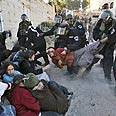
Poll: Most Jews feel connection to Hebron
Almost three-quarters of Israeli Jews surveyed feel attachment to West Bank city, with almost half of these attributing this to 'certain Jewish feelings'
A poll conducted on the heels of the recent eviction of the disputed house in Hebron has revealed that the majority of Israelis, including 61% of the secular population, have some emotional attachment to one of Judaism's four holiest cities.
The survey was conducted for Ynet and the Gesher Institute by the Panels Institute, and included 500 respondents that are a representative sample of the adult Jewish population in the country. The margin of error is 4.5%.
Out of 73% of respondents who answered in the affirmative when asked whether they felt an emotional connection to Hebron, 46% said they had "certain Jewish feelings" toward the city, while 27% said they consider Hebron a "very holy city"; 27% of the respondents admitted to having no special feelings towards
Hebron.
Only nine percent of the seculars polled described Hebron as a "very holy city," as opposed to 88% of the religious respondents.
According to the poll, religious Israelis believe the eviction has strengthened the emotional ties to the West Bank city, while secular Jews believe the opposite to be true.
For example, 63% of Haredim and 64% of other Orthodox Jews believe that the Jewish connection with Hebron has been strengthened because of the eviction, whereas 49% of secular respondents believed the connection had been destroyed. The difference in these results appears to derive from the settlers' defiance.
Resistance strengthens connection
Asked about the effects of the violence surrounding the eviction of the disputed house in Hebron, 41% said settlers' resistance to eviction damaged the emotional ties to the city, while 28% were convinced that it only strengthened the connection to the city; 21% said the settlers' refusal to comply with the eviction order had no effect on the emotional attachment to Hebron
The poll indicated that secular and religious Jews alike believe that the acts of revenge against Palestinians in Hebron that followed the eviction were criminal and contradicted Judaism's values
Regarding the acts of violence against Arab residents of Hebron following the eviction, 52% of individuals surveyed said "they were just criminals, and this has no relation to Judaism," and 33% claimed that the behavior was antithetical to Judaism
However, 6% said that "vengeance is an important value in Judaism and therefore it is permitted to hurt Arabs in the city." The rest of the respondents refused to answer the question.
The discrepancy between age groups regarding this question was notable. 29% of individuals between the ages of 18 and 20 answered that vengeance is an important Jewish value that justifies harming Arab residents of Hebron, in comparison to 1% and 9% in other age groups.
In terms of religious breakdown, all levels of piety contained members who said that vengeance was criminal or antithetical to Jewish values.
Gesher Director Shoshi Becker noted that the repudiation of vengeance crossed all sectors – secular, conservative, religious and Haredi. The role of the public and of educators is to decry this phenomenon and explain to the younger generation how far such actions are from Jewish tradition and how they merely serve to distance the public, instead of creating a real Jewish connection."










